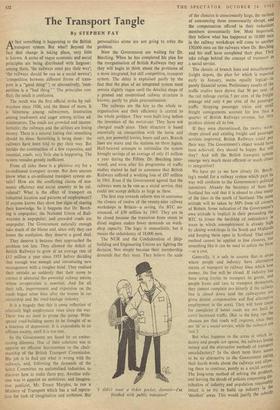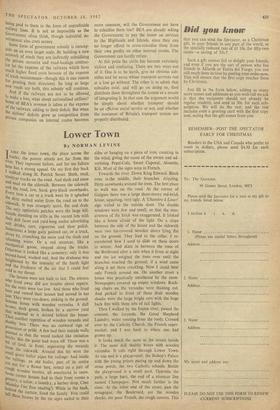The Transport Tangle
By STEPHEN FAY
Alast something is happening to the British transport system. But what? Beyond the fact that change is taking place, very little is known. A series of vague economic and social principles are being distributed with largesse: among them, 'the railways must pay their way'; `the railways should be run as a social service'; `competition between different forms of trans- port is a "good thing" '; or alternatively, 'com- petition is a "bad thing."' The principles con- flict; the result is confusion.
The result was the first official strike by rail- waymen since 1926, and the threat of more. It is bitterness among railwaymen, frustration among road-users and anger among. airline ad- ministrators. The roads are crowded and uncom- fortable; the railways and the airlines are losing money. There is a natural feeling that something should be done. Something is being done: the railways have been told to pay their way. But besides the construction of a few expensive, and essential, roads, very little else is happening. The system remains grossly inefficient.
From all sides there is a plaintive cry for a co-ordinated transport system. But does anyone know what a co-ordinated transport system en- tails? How are the conflicting claims of eco- nomic efficiency and social amenity to be cal- culated? What is the effect of transport on industrial location and patterns of employment? If anyone knows they show few signs of sharing their knowledge. So it happens that Dr. Beech- ing is unpopular; the National Union of Rail- waymen is unpopular; and crowded roads are unpopular. The Government naturally enough take much of the blame and, since only they can lessen the confusion, they deserve a good deal.
They deserve it because they approached the problem too late. They allowed the deficit of British Railways to grow at an average rate of f15 million a year since 1953 before deciding that enough was enough and introducing new management with a tougher brief. They realised their mistake so suddenly that their move to correct it alienated the powerful railway unions whose co-operation is essential. And for all their talk, improvement and expansion on the roads began some time after the booms in car ownership and the road-haulage industry.
It is a tragedy that this is some reflection of
relatively high employment rates since the war. There was no need to prime the pump. Wide- spread road-building seems to be thought of as a function of depression. It is expendable in an affluent society, until it is too late.
So the Government are faced by an embar- rassing dilemma. One of their solutions was to appoint an efficient businessman to the chair- manship of the British Transport Commission. His job is to find out what is wrong with the railways, and, following the demands of the Select Committee on nationalised industries, to discover how to make them pay. Another solu- tion was to appoint an ambitious, and imagina- tive, publicist, Mr. Ernest Marples, to run a Ministry of Transport which has a sad reputa- tion for lack of imagination and ambition. But personalities alone are not going to solve the problem.
Now the Government are waiting for Dr. Beeching. When he has completed his plan for the reorganisation of British Railways they say they will begin to think about the problems of a more integrated, but still competitive, transport system. The delay is explained partly by the fact that the plan of an integrated system must remain slightly vague until the detailed shape of a pruned and modernised railway structure is known; partly by plain procrastination.
The railways are the key to the whole re- organisation and their efficiency is central to the whole problem. They were built long before the invention of the motor-car. They have not changed much since. Their structure is based essentially on competition with the horse and cart, not powerful lorries, buses and cars. Branch lines are many and the stations on them legion.
Half-hearted attempts to rationalise the system brought savings of an average of only £1 million a year during the Fifties. Dr. Beeching inter- vened, and soon after his programme of traffic studies started he had to announce that British Railways suffered a working loss of £87 million in 1961. Even if the Government agreed that the railways were to be run as a social service, they could not accept deficits as large as these.
The first step towards reform was to announce the closure of twelve of the twenty-nine railway workshops in Britain—a saving, the BTC an- nounced, of £30 million by 1967. They are to be closed because the transition from steam to diesel engines makes fewer demands on work- shop capacity. The logic is unassailable, but it means the redundancy of 18,000 men.
The NUR and the Confederation of Ship- building and Engineering Unions are fighting the decision. Not simply because their membership demands that they must. They believe the scale
`1 didn't want a ticket pocket, dammit-1'm finished with public transport!'
of the closures is unnecessarily large, the method of announcing them unnecessarily abrupt, and the compensation offered to their redundant members unnecessarily low. Most important, they believe what has happened to 18,000 men in the railway workshops will come to another 130,000 men on the railways when Dr. Beeching and his staff have completed their plan. They take refuge behind the concept of transport as a social service.
The closure of branch lines and miscellaneous freight depots, the plan for which is expected early in January, seems equally logical—in purely financial terms. Preliminary results of the traffic studies have shown that 50 per cent. of the rail mileage carries 5 per cent. of the freight tonnage and only 4 per cent. of the passenger traffic. Stopping passenger trains and small freight consignments account for less than a quarter of British Railways revenue, but they produce almost all its loss.
If they were discontinued, the twelve work- shops closed and existing freight and passenger services improved, British Railways could paY their way. The Government's object would have been achieved; they should be happy. But will they? And will the British transport system emerge very much more efficient or much closer integration?
We have yet to see how closely Dr. Beech- ing's model for a railway system which pays its
way will conform to the Government's political intentions. Already the Secretary of State for Scotland has said that it is absurd to close manY of the lines in the north cf Scotland. The same
attitude will be taken by MPs from all corners of Britain. Some indication of the Government's
own attitude is implicit in their persuading the BTC to lessen the hardship of redundancy in areas in which unemployment is already high by closing workshops in the South and Midlands and keeping them open in Scotland. That exact method cannot be applied to line closures, but something like it can be used to soften the blow —at a cost.
Generally, it is safe to assume that in areas where people and industry have alternative means of transport to railway lines which lose
money, the line will be closed. If industry has been using lorries to transport its goods, and people buses and cars to transport themselves, they cannot complain too bitterly if the railway line is closed down (and the railwaymen are given decent compensation and find alternative employment in the area). They will have cause for complaint if better roads arc not built to carry increased traffic. (But in the long run the chances are that roads will improve, since they are 'in' as a social service, while the railways are `out.') But what happens to the areas in which in- dustry and people are sparse, the railways losing money and the alternative methods of transport unsatisfactory? In the short term there seems to be no alternative to the Government eating their harsh words about the railways and allow- ing them to continue, purely as a social service. The long-term method of solving the problenl, and leaving the shreds of policies concerning dis- tribution of industry and population reasonably intact, is to try to build up industry in the `desolate' areas. This would justify the subsidy being paid to them in the form of unprofitable railway lines. It is not as impossible as the Government often think, though industrial de- velopment also costs money.
Some form of government subsidy is inescap- able on an even larger scale. By building a new network of roads they are indirectly subsidising the private motorist and road-haulage contrac- tor (at the expense of the railways which have Much higher fixed costs because of the expense of track maintenance—though this is one reason for pruning their structure). So long as large new roads are built, this subsidy will continue.
And if the railways are not to be allowed, to make a loss, what about nationalised airlines? Some of BEA's revenue is taken at the expense of the railways, adding to their deficit. But when the airlines' deficits grow as competition from private companies on internal routes becomes more common, will the Government not have to subsidise them too? BEA are already asking the Government to pay the losses on services to the Highlands and Islands, since they can no longer afford to cross-subsidise them from their own profits on other internal routes. The Government can hardly refuse.
At this point the circle has become extremely vicious and confusing. There are two ways out of it. One is to be harsh, give no obvious sub- sidies and let areas whose transport services run at a loss go without. The other is to admit that subsidies exist, and will go on doing so, thed distribute them throughout the system as a means of integrating it. In that case the argument would be simply about whether transport should be an efficient social'service or not, and whether the resources of Britain's transport system are properly distributed.















































 Previous page
Previous page